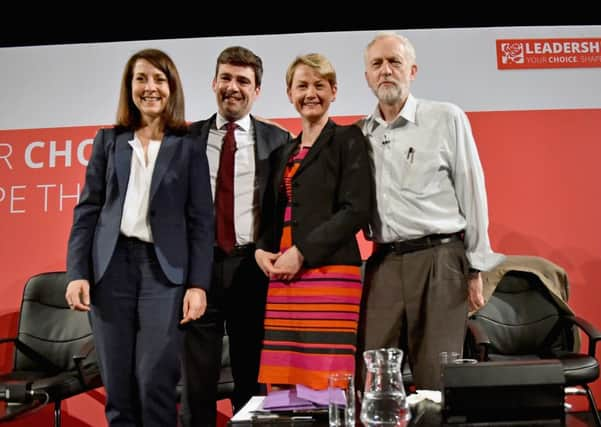Andrew Wilson: Labour hopefuls don’t deserve to win


Clydebuilt is a term that stirs the hearts of many, uniting the souls of those drawn to the politically romantic “red” history of Clydeside and those who admire the risk-bearing, globe-trotting, entrepreneurial magnificence of an industry that produced 30,000 plus of the world’s ocean going ships, and by the early 20th century, one fifth of all the ships in the world. Imagine that.
Until this week it was largely accepted by far too many that it was written into our modern DNA that Scotland’s once great docks could never dare to compete save for smaller boats or government contracts.
Advertisement
Hide AdAdvertisement
Hide AdThat changed on Wednesday when we read that one of Scotland’s most successful business entrepreneurs, Jim McColl, is to re-open one of the giant dry docks on the Clyde and dare to dream and hopefully deliver. In a moment he has reframed business and trade union minds to the possibilities. He might not succeed, but at least he is giving it a go. That, in a nutshell, is how greatness is achieved, the willingness to risk defeat alongside the audacious drive to win.
“All great truths begin as blasphemies.” George Bernard Shaw’s phrase is one of the favoured quotes of my great friend and mentor, the former enterprise minister and self-made success, Jim Mather.
McColl’s heresy is a positive one that we hope becomes truth. He is showing leadership, driven by the profit motive, that if successful, will create jobs, reduce poverty and put Scotland back on the global industrial map. All things are possible.
Contrastingly, in the world of politics last week, Her Majesty’s Official Opposition were all at sea, and not in a good way. “Not waving, but drowning,” without a captain, a compass or a North Star to guide them. They exist so they must sail. But they know neither why, nor where, so listlessly they edge towards the rocks.
To win the power to change, a party has to convince the electorate of its competence to lead and govern. To win the right to be trusted, it must first successfully oppose the incumbent government and demonstrate why it no longer deserves office.
The Labour party is light years from the first and not even vaguely attempting the second. During this week’s high farce at Westminster over the Tory government’s welfare cuts, Labour’s “leadership” called for the party’s MPs to abstain rather than oppose proposals that would hurt families, children and the poor.
The core political weakness I observe is that Labour are allowing the entire policy context and their own place within it to be framed by the Tories. This is fatal.
The bit they do control, their leadership election, has seen them frame the debate around the pull of left-winger Jeremy Corbyn rather than any sense of what the other candidates want. No purpose, no North Star, no compass.
Advertisement
Hide AdAdvertisement
Hide AdThe received wisdom is not politically stupid at all: it is that elections can only be won from the centre ground and that you have to win power to help people, therefore you must go after the centre ground.
Where Labour risk destroying themselves is in allowing the Tories, with a Commons majority secured on the votes of less than one in four of the electorate, to define what the centre ground is. Bereft of a sense of purpose for themselves, or even a working critique of what’s wrong with the Tory agenda, Labour are left looking reactive, shifty, adrift.
Anyone who tuned into Labour party MPs this week heard only febrile ferocity against each other or a The Thick Of It parody of process speak which would have been hilarious were it not meant to be serious: “We oppose the bill we abstained on because we will take on the details later in committee. Yes it’s a mess, but I don’t regret doing it. I regret this.” Eh?
Meanwhile, the Tories are being left unopposed save by the group of SNP MPs and the smaller parties. Labour, in turn, are not so much asleep at the ship’s wheel as brawling drunkenly in port bars refusing to return from shore leave. Risible.
The challenges we all face together are colossal. We risk beggaring the next generation if we don’t right our finances. But we risk beggaring too many of the current one if we don’t right our economy first.
The opportunity for leaders to define what the unifying centre ground should be has never been greater.
George Osborne is one of the most politically clever politicians of his era. His weakness is that, for him, politics trumps policy, which ought to be fatal for his reputation. Instead it is enhancing it, as he tangles his Labour opponents in the web he weaves.
Labour are letting him off the hook in a quite unforgiveable way. We should be debating the major questions of how to deliver sustainable growth, fairly and competitively generated tax revenues and well funded public services.
Advertisement
Hide AdAdvertisement
Hide AdBut Labour have allowed a clever Tory Chancellor to make this a debate about a tiny portion of just over 1 per cent of public sector expenditure when it bites hardest.
He makes the country’s travails about a small group of the poorest, and in the face of that Labour offer only squabbling voices and silence where votes should stand tall.